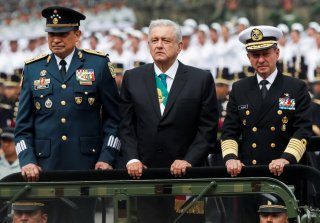Creeping Military Politicization Puts Mexico and Brazil at Risk
It would be a tragedy if Latin America were to return to first another cycle of military involvement in politics or even a return to military rule, followed by another multi-decade effort to get the soldiers back in the barracks.
Military Vote Counters?
Setting up the military as a counterweight to institutions that he does not control forms an element of Bolsonaro’s method of governing. In 2021 during a time of tension with Congress, he ordered tanks onto the streets of Brasilia in a “military parade,” raising memories of previous military takeovers. More recently, he has wrapped the military into his campaign to cast doubt on Brazil’s electoral system where he has charged that Brazil’s electronic voting system could be used to fraudulently deprive him of victory in his re-election campaign. (Elections are in October and while he has partially closed the gap, he lags behind Lula, who is seeking a new term for himself.)
As part of that campaign, a general serving on an advisory committee on electoral transparency submitted a list of concerns with the electoral system, while Bolsonaro himself raised the possibility of the military running its own parallel electoral count. Despite criticism, he has ratcheted up his effort to cast doubt on the electoral system, with his defense minister joining in the attack. Is Bolsonaro setting himself up to challenge an unfavorable result? And if he is, will he seek military backing to undo it? These issues have begun to seize Brazil’s media and political class as election day grows closer.
A Hemispheric Trend
That both AMLO on the Left and Bolsonaro on the Right have sought to entangle the military into politics may be part of a larger crisis of democratic governance in Latin America. The care which was generally taken in the past to keep the military in its normal institutional role has lessened as the democratization wave of the 1980s fades into the distance and a new less cautious generation comes to power.
We have seen this in El Salvador, where right-wing President Nayib Bukele even sent troops into Congress to observe as it voted on funding for anti-crime efforts, and in Colombia, where, during his campaign, now President-elect Gustavo Petro accused senior military officials of being linked to drug traffickers, leading the army commander-in-chief to respond sharply. This is, of course, separate from the long-standing party-army symbiosis which exists in Cuba, Nicaragua, and Venezuela and supports undemocratic regimes in power.
Ultimately, whether it is in Mexico, Brazil, or elsewhere, it is up to the citizenry to act as a brake on creeping politicization of the military. But the international community ought to recognize this phenomenon and call it out. One positive signal was given during the July 2021 visit of CIA director William Burns to Brazil, where, according to recent press reports, he stressed the need to respect democratic electoral processes. It would be a tragedy if Latin America were to return to first another cycle of military involvement in politics or even a return to military rule, followed by another multi-decade effort to get the soldiers back in the barracks.
Richard M. Sanders is a Global Fellow of the Woodrow Wilson International Center for Scholars. Formerly a member of the Senior Foreign Service of the U.S. Department of State, his assignments included service as Deputy Director of the Office of Mexican Affairs from 2005 to 2007, as Director of the Office of Brazilian and Southern Cone Affairs from 2010 to 2013, and as Foreign Policy Advisor to the Chief of Staff, U.S. Army from 2016 to 2018.
Image: Reuters.

